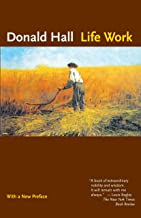Life Work, Donald Hall 1993
One of my favorite books of all time, the one I have given to a number of friends as they celebrate a major birthday, this is vintage Donald Hall. A man whom I met when he was a professor at the U of Michigan and I was a medical student arranging for a dinner speaker for our annual honors dinner, Hall was terrific company at the table and at the podium. Smart, funny, and clever, he was the ideal speaker and my pen pal for over 50 years after we both left Ann Arbor. I thought I was very special until I read in this book that he sent about 5000 letters and postcards a year!!!! He died two years ago and I still miss his typed return letters with corrections made with black ink. He was a huge presence in American letters—-a US Poet Laureate and a winner of the National Book Critics Circle Award. He wrote poetry, essays, short stories, and my very favorite children’s books, ‘The Ox Cart Man’ and ‘The Man Who Lived Alone’. ‘Life Work’ is unusual in that he writes about writing it as it was being written, a time fractured by a diagnosis of metastatic liver cancer that would interrupt his writing and threaten to interrupt his life. He survived another 25 years though losing his beloved Jane Kenyon to leukemia during that time. ‘Life Work’ is all about working and the joys of absorbedness. His description of ‘the best day’ has stayed with me over the years and closely reflects my own feelings: “The best day begins with waking early—I check the clock: damn!, it’s only 3:00AM—because I want so much to get out of bed and start working…..By four-thirty I can wait no longer. I leap out of bed, feed the cat, let the dog out, start the coffee, dress, drive two miles for the Globe, saving the sports section until last, I feel work-excitement building, joy-pressure mounting—until I need resist it no more but sit at the desk and open the folder that holds the day’s beginning, its desire and its hope.” The book while focused on work and its joys, also goes into enough detail about his ancestors that I was able to draw a fairly complete family tree, right back to his great-grandparents among whom were Ben and Lucy Kenneston, the ones who bought the New Hampshire farmhouse in 1865 that Hall and Kenyon moved to in 1975 and where they lived until Hall died in 2018. This is a wonderful book, like all of his non-fiction, blending history, family, place, and work into a deeply meaningful story of life and life work.



